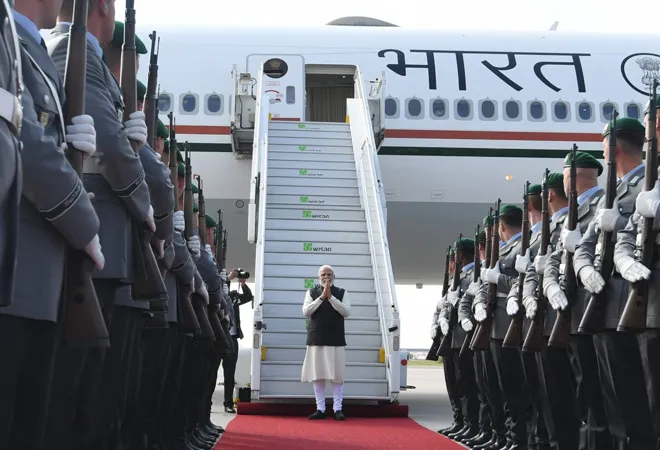
There is a newfound momentum in India–EU ties. Prime Minister Modi’s
recent visit to three important European countries Germany, Denmark, and France sought to build on this energy. Amongst important highlights, the visit came at the heel of the recent visit by the President of the European Commission, Ursula Von der Leyen to India during the three-day Raisina Dialogue in Delhi. While the visit by von der Leyen proved an important opportunity to review the headway in the India–EU Strategic Partnership, PM Modi’s visit charted a new course not just for India’s ties with three important European partners but the entire European Union (EU). Specifically, PM Modi’s visit ensured that India’s ties with Germany, Denmark, and France stand reinvigorated.
The sixth Indo-German Inter-Governmental Consultations (IGC) provided both countries the opportunity to engage at the highest level after Olaf Scholz took over as the Chancellor.
The first pitstop, Germany, marked a critical advancement in bilateral ties. The visit was important from a symbolic perspective as well as concrete outcomes. The sixth Indo-German Inter-Governmental Consultations (IGC) provided both countries the opportunity to engage at the highest level after Olaf Scholz took over as the Chancellor. The sixth IGC sought to cover a
wide range of issues that expanded the scope of the Indo-German strategic partnership. Amongst important areas under the expansive bilateral agenda were shared commitment on multilateral interests; green and sustainable development; trade, investment, and digital transformation; global health; political and academic exchange; scientific cooperation; and mobility of workforce and people. The German
pledge to commit an additional 10 billion euros to help India achieve its 2030 climate targets is expected to lessen India’s reliance on fossil fuels. In particular, the signing of two
Joint Declarations of Intent (JDI)—on the exchange and mutual protection of classified information between the Ministry of External Affairs, India, and the German Foreign office through encrypted channels and the establishment of green and sustainable development partnership are steps that are expected to enhance trust in the long term through engagements on sensitive issues and sharing of information as well as to build a futuristic roadmap for stronger ties. Beyond the agreements, as Germany seeks an unprecedented recalibration with its altered foreign and security policies in Europe in the wake of the Ukraine-Russia war, the accommodative attitude in its relations with India occupies a conspicuous moiety.
The Green Strategic Partnership was a standout of PM Modi’s visit to Denmark, besides cooperation in the area of renewables, trade, culture, climate, and health. At least seven government-to-government agreements were also
signed between India and Denmark. However, the visit to Denmark by PM Modi went well beyond the bilateral agenda through its outreach to other Nordic countries. The second India-Nordic Summit sought to tap into some of the
strengths of these countries in areas like sustainability, climate change, digitisation, innovation, technology, and renewable energy. An important component of India’s outreach to the Nordic countries is the cooperation in the Arctic region. Even as climate change is
compelling a reorientation of outlook in the Arctic by most countries, with new opportunities for navigation and exploration, India’s partnership with Nordic countries could open up environmental, scientific, and strategic avenues in the next decade. As an Observer in the Arctic Council, India’s broader engagements with the Nordic countries will go a long way in cementing its position as a strong player in the rapidly changing regional dynamics.
Even as climate change is compelling a reorientation of outlook in the Arctic by most countries, with new opportunities for navigation and exploration, India’s partnership with Nordic countries could open up environmental, scientific, and strategic avenues in the next decade.
France, as one of the most solid anchors for India in Europe, was befitting as the final destination of the three-nation tour. Partnership in the Indo-Pacific remained a strong iteration in the discussions, besides commitments to improve other aspects of the bilateral relationship such as cyber security, start-ups, counterterrorism, blue economy, urban development, and coordination in important multilateral forums such as the G20.
Changing European interests
PM Modi’s visit to Europe marks a new dynamic in the ties between India and Europe, primarily as the European continent has been in a state of conflict and has sought serious recalibrations across political, diplomatic, and security domains. For India, these readjustments in Europe could have two sets of implications, one impacting its ties with the West and the other on its ties with Russia. India’s strategy of taking an independent stand on the issue of Ukraine and not explicitly supporting any one side may be geared to back its trade focus on either side of the political divide. This was also evident during some of the
announcements made during the visit including the launch of the EU–India Trade and Technology Commission to smoothen cooperation between different areas and provide an advisory role. As the map shows below, India’s share of export and import with Europe is amongst the top 10 countries in the world.

One of the important but understated achievements of this three-nation visit was the centrality that India has received in the emerging Euro politics, especially one that prioritises the embrace of India over any political censuring apropos India’s distinctive stand on the Russia–Ukraine war. India’s focus on improving trade relations, strengthening supply chains, and improving India as a manufacturing hub remains a strong purpose, even as it is trying to steer clear of the crossfire between the ongoing Russian onslaught and trans-Atlantic retaliations.
The common strands connecting India’s engagements with all the three European countries during PM Modi’s visit were sustainable development, post pandemic recovery, food security, migration, mobility, and global stability in the Indo-Pacific. If anything, the visit showcased why the Indo-Pacific remains central to the emerging joint strategic purpose of both the EU and India. Cutting across the agendas of Denmark, Germany, and France, the Indo-Pacific resolved remained unwavering. While Germany welcomes the friendly visit of an Indian naval ship to the German port next year, France sought to align its bilateral agenda with India in the Indo-Pacific with the broader European vision of the region. The EU’s emerging Indo-Pacific outlook has been doubled down by the various European powers’ individual Indo-Pacific strategy. Amongst the countries visited by PM Modi, France and Germany have already charted their vision to navigate this increasingly complex region, while Denmark looks to strategically embrace the Indo-Pacific region.
The EU’s emerging Indo-Pacific outlook has been doubled down by the various European powers’ individual Indo-Pacific strategy.
Riding on the necessities engendered by the ongoing war in Europe, there is a gradually settling fear in Europe of a narrowing vision that seeks to constrain the continental worldview in a horizontal strategic landscape ning the Americas to Russia. As such, partnership with strong Asian partners like India provides Europe with the verticalisation of its outreach. For European countries, strong relationship with India provides an anchor in the Indo-Pacific region. At a time when the primary focus of Europe is towards the crisis in Ukraine, underscoring partnership with India on a broad and forward looking agenda which transcends war compulsions is telling of Europe’s own desire to keep its multilateral interests diversified and well anchored.
Ukraine did loom large during the visit but India’s ability to straddle the difficulties in Europe with the larger vision of development and partnership may just have proved that the two may not necessarily work at cross-purpose with each other. Beyond the immediacy of the ongoing war, India and Europe remain united by long-term visions in areas of global food security, instability in Afghanistan, and the stability of power balance in the Indo-Pacific.
The views expressed above belong to the author(s). ORF research and analyses now available on Telegram! Click here to access our curated content — blogs, longforms and interviews.



 There is a newfound momentum in India–EU ties. Prime Minister Modi’s
There is a newfound momentum in India–EU ties. Prime Minister Modi’s 
 PREV
PREV


